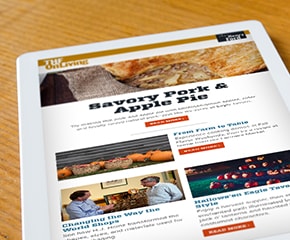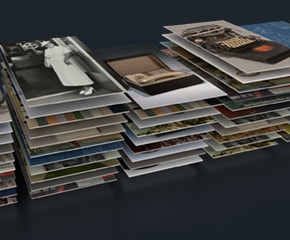Criss-crossed Conveyors at Ford Rouge Plant, 1927
Add to SetSummary
In 1927, Ford Motor Company commissioned Charles Sheeler to do a series of documentary photographs of its River Rouge industrial complex near Dearborn, Michigan. The conveyors moved coal and coke to the pulverizing building and screening stations. Coke made from coal was used in the steelmaking process of the blast furnaces. This vigorous photograph shows Sheeler's ability to form a compelling image from a complicated scene. …
In 1927, Ford Motor Company commissioned Charles Sheeler to do a series of documentary photographs of its River Rouge industrial complex near Dearborn, Michigan. The conveyors moved coal and coke to the pulverizing building and screening stations. Coke made from coal was used in the steelmaking process of the blast furnaces. This vigorous photograph shows Sheeler's ability to form a compelling image from a complicated scene.
Charles Sheeler is recognized as one of the founders of American modernism and one of the master photographers of the 20th century. Equally gifted as a photographer and painter, Sheeler used photographs, drawings and paintings to refine common motifs.
In 1927 Vaughn Flannery, art director of the advertising agency N.W. Ayer & Son suggested to his Ford Motor Company clients that they commission a series of documentary photographs of Ford Motor Company's River Rouge industrial complex near Dearborn, Michigan, at this time "the largest industrial complex in the world." Flannery first offered the job to Edward Steichen, who turned it down because of his contract with the advertising agency J. Walter Thompson. Steichen, who called the Rouge contract "the finest photographic commission anybody ever got," suggested Charles Sheeler, already well known for his still life paintings and photographs.
The artist's visit to River Rouge was an outstanding experience which introduced him to a subject he used throughout his career. American industry became the focus of his art for the next thirty years. Sheeler photographed the Rouge for about six weeks, from late October until the end of November, just before the unveiling of the new Ford Model A automobile on December 2, 1927.
Sheeler took more than thirty-two photographs. Of the prints he developed, one group went to Ford Motor Company. Of these, only twelve 8 x 10 inch copy negatives were made by the company in 1929 from the original photographs. The company used these images for the covers of their magazine, Ford News between 1929 and 1930. Today, these 1929 contact prints are part of the collections of The Henry Ford.
Artifact
Photographic print
Subject Date
1927
Creators
Ford Motor Company. Engineering Photographic Department
Place of Creation
United States, Michigan, Dearborn
Creator Notes
Photographed by Charles Sheeler in 1927 for Ford Motor Company. Copy negative made by Ford's Engineering Photographic Department in 1929.
Keywords
Collection Title
On Exhibit
By Request in the Benson Ford Research Center
Object ID
84.1.1660.P.189.6577
Credit
From the Collections of The Henry Ford. Gift of Ford Motor Company.
Material
Paper (Fiber product)
Technique
Gelatin silver process
Color
Black-and-white (Colors)
Dimensions
Height: 10 in
Width: 8 in





